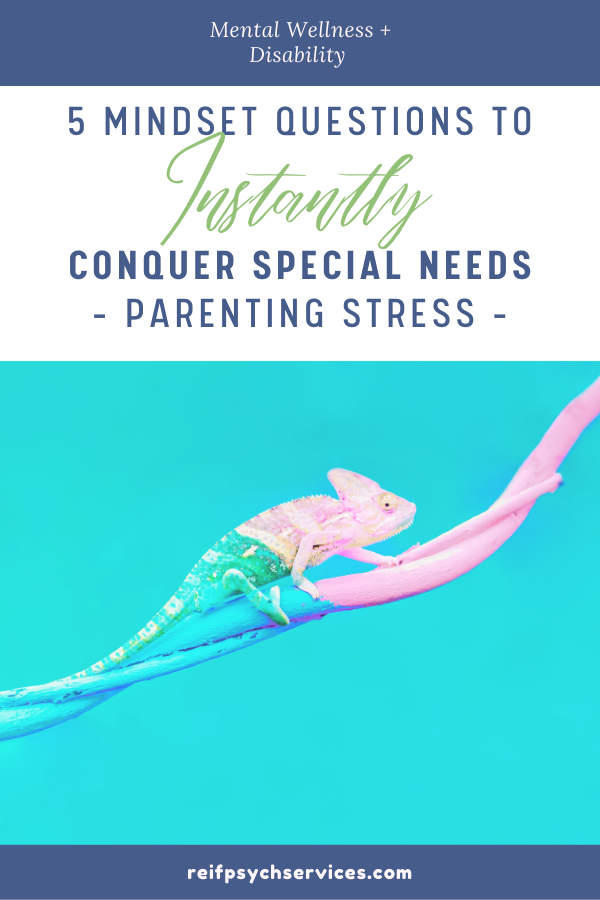Most people think special needs parenting stress is physical. They see devices, equipment, medicines, and meltdowns. They assume that the these are the things that make you feel overwhelmed.
People have no idea.
Most people would never guess that the hardest part of raising your child has less to do with your child, and more to do with the reactions that other people have to your child.
To say nothing of how fatiguing it is to be constantly ‘on’. You never know when your child will be hurting, or might hurt someone else. So, you constantly watch, listen, even smell for signs of trouble. Always tense, apprehensive, knowing that something will go wrong. You can feel your blood pressure rising when you see your child’s teacher on caller ID.
What is it this time?
You grew up believing that good parents raised good kids. That if parents cared and were attentive enough, their kids would grow up to be kind, thoughtful, calm, patient adults.
Now, after having read enough about your child’s diagnosis to have earned a doctoral degree, you know better.
You know that no amount caring, wanting, or doing can change your child’s biology or neurology. You know that some days are just tough.
But no matter how well you understand this logically, if you’re like most of my counseling clients who have kids with disabilities, you probably still have trouble believing that you’re doing alright. That you’re doing enough. That you are enough.
When you feel this way, it’s a myth to think that a weekend away, or a massage, or any other self-care Band-Aid could change your beliefs.
What you truly need is not to change your circumstances, but how you understand them. This is adjusting your mindset.
That’s why, this week, I’m sharing with you something that I often share with my clients in therapy.
Read on to learn the 5 mindset questions to help you instantly conquer special needs parenting stress

1. Am I trying to sprint through a marathon?
Many parents raising kids with disabilities are racing. They tell themselves that they will feel calmer, more peaceful, and more in control at some point in the future. When they cross a finish line that seems very close within reach:
- When we finish adjusting his meds
- After she gets the new AAC device
- When he graduates High School
And so on.
Inevitably, some new challenge besets these parents. They again find themselves pushing toward a new finish line. Sacrificing their own mental and physical health in the hope that one day soon they’ll make more time for themselves.
To parents who feel this way, I use the analogy of a runner sprinting versus one who is running a marathon.
Both are races and tests of your physical abilities.
But how you mentally and physically approach a sprint is quite different from how you get ready for a marathon
Sprinters can see the finish line before they start racing. They must push toward it with a burst of energy, because the goal is to cross it as fast as possible. A sprinter in training focuses on technical form. Slight adjustments can influence their times by fractions of a second. For a sprinter, this can mean the difference between winning and losing.
A marathon runner has a completely different set of priorities and obstacles. If a marathon runner were to push as hard as they could at the start of the race, they would lack the energy to go for 26.2 miles. A sprinter would never weigh themselves down with a sun visor, headphones, or a belt full of race fuel. But a marathoner knows that distance running is as much a mental challenge as it is physical. Preparing for both is how they build endurance. Speed matters, but it won’t matter at all it if you don’t have the distress tolerance to reach the finish line.
Many special needs parents are approaching the rest of their life as a parent to child with disabilities as if it is a sprint. In truth, it is more akin to a marathon. I encourage them, as I encourage you now, to ask themselves:
- What would I do differently if my goal wasn’t to finish fast, but to conserve my energy?
- How am I meeting my physical and mental needs so that I can better tolerate distress?
- What if that the ‘finish line’ I’m racing towards isn’t an end point, but is just another mile marker on a very long course. How does that change my approach?
2. How might I feel differently if my child had a different disability?
Many of the special needs parents I see for counseling feel embarrassed or guilty about their child’s behavior. Especially when their child has an invisible disability like Autism, anxiety, or ADHD. They feel unsure about asking for accommodations. They find themselves apologizing profusely when their child does something unexpected. Mostly, these parents feel judged by their child’s teachers, coaches, and by other parents in the community because of their child’s behavior.
I ask these parents to consider how it would be different if their child had a medical need instead of a developmental disability or mental health condition.
If, for example, your child had Type 1 Diabetes instead of Autism.
You wouldn’t feel guilty for ensuring that their teacher was following their protocol and checking their glucose. You would know that this is simply the monitoring that’s required to keep your child healthy.
It wouldn’t be tough to ask other neighborhood moms to call you if your child has any erratic behavior while playing at their house. Everyone would understand that this might be an early warning sign of a critical health need.
You’d be glad to give suggestions for sugar-free treats to teachers and other parents planning parties and get togethers. You want your child to take part without feeling like they are different or a nuisance.
What makes Type 1 diabetes so different from Autism? Maybe not that much.
They are both conditions due to differences in biology. Children with both disorders need supervision and compassion from caring adults so that they can learn to recognize and manage their own needs.
So, apply this logic to your child’s Autism.
How would it be to not feel guilty about requesting another IEP meeting to ensure that your child’s BSP is being followed? To understand that you’re not nagging, you’re advocating for your child to receive the support they need.
Imagine if you could explain your child’s Autism to other parents without apologizing. If you could assume they’d understand and want to be supportive.
What if you didn’t feel like you were pushing if you pointed out sensory triggers or unrealistic behavioral expectations that might have a negative impact for your child?
3. What would I expect someone else to do in the same situation?
This is a common question that people ask to spark self-compassion. I encourage you to think of a very specific person, rather than a vague ‘someone else’. What would you think about
- Mom you met at a special needs parent support group
- A total stranger you saw managing their child’s meltdown in the grocery store
- Your neurotypical child, in the future, caring for their sibling after you aren’t able to anymore
Would you say about this person the things that you say when you talk about yourself? Would you doubt their abilities or intentions the way that you question your own? When talking about their future, would you use words like hopeless and trapped?
I imagine not.
Probably, you would want them to see the good, difficult things that they’re doing, even if not everything is going to plan. You would call them resilient and you would be impressed by how much they’ve learned.
You can extend this empathy and understanding to your child, your friend, or a complete stranger in the produce section. Surely you can give a bit of it to yourself.
4. Is my discomfort based on facts or on feelings?
This is a classic Socratic question that counselors encourage clients to ask themselves. We can all be guilty of emotional reasoning. We falsely believe that our feelings are 100% accurate.
But, just because I feel scared doesn’t mean that something scary is actually going to happen. My feeling may be influenced by many things, and may not take facts into account.
I encourage my clients to approach their uncomfortable feelings like a scientist proving a theory, or an attorney arguing a case.
Look at the facts, consider the evidence, ask what explanations might be true other than what you feel. When we do this, we recognize that our feelings are our old familiar scripts for looking at things. Then we can see that what’s actually going on tells a much different story.
5. When I retell this chapter of my life, what is the story I want to tell? Who is the hero of that story?
The stories we tell ourselves have great influence on our moods and our perspective. When you talk about your life, are you describing a hero who overcomes adversity? Or do the words you use reflect that you see yourself as a victim, with no say in your own future.
Recognizing that you have choices, and that your decisions have significance for your future, is a key component of mental health. In psychology, we refer to people as having either an internal or an external locus of control.
This is the extent to which you believe that have the power to influence the events in your life. A person with an internal locus of control sees that she can influence events and their outcomes. In contrast, someone with an external locus of control blames outside forces for everything. They feel quite powerless to effect change in their life.
This classic article, Moderators of Stress in Parents of Children with Autism, notes that, for parents raising Autistic kids, having an external locus of control is:
“linked to depression and anxiety in response to negative life changes…Reminiscent of learned helplessness, individuals who experience stress and view themselves as having no control over events may be most susceptible to the influences of life stress.”
Forcing yourself to see the choices that you do have, and to recognize the aspects of your life which are within your control, is one way to develop a stronger internal locus of control. This is how you become the hero of your own story.
Summary
Adjusting your mindset is a key component to overcoming special needs parenting stress. I sometimes say to parents that the quality of your choices depends upon the quality of the questions you ask yourself.













